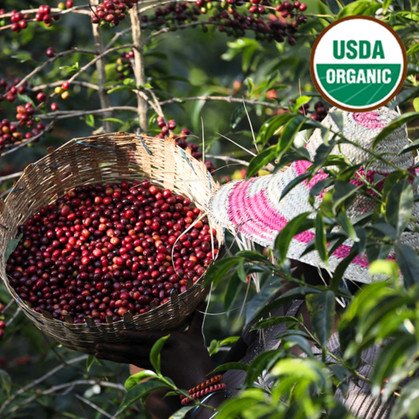ETHIOPIA : CHELBESA NATURAL (CERTIFIED ORGANIC)


ETHIOPIA : CHELBESA NATURAL (CERTIFIED ORGANIC)
Tasting Notes: Blackberry, Mandarin Orange, Tropical Fruit
Cup Characteristics: Bright and Fruity
Processing: Full natural and dried on raised beds
Region: Gedeb District, Yirgacheffe , Ethiopia
Producer: Chelsea Wet Mill
Altitude: 1950-2200 MASL
Varietals: Wolisho, Dega
The Chelbesa kebele (village) is a renowned producing area in Yirgacheffe in the Gedeo Zone of Ethiopia’s Southern Nations, Nationalities, and Peoples' Region (SNNPR). Here, shade-grown coffee thrives under a dense, layered, semi-forest canopy. The Chelbesa wet mill was established in 2019 with the goal of sourcing fresh coffee cherries from hundreds of nearby smallholders. Over 760 producers contributed to this Grade 1 natural processed coffee.
Considered by many to be the birthplace of coffee, Yirgacheffe needs little introduction. Ancient landrace varieties dominate the smallholder coffee gardens that are often organic by default, tended by farmers who intercrop food crops to maximize the potential of this region’s fertile soil.
Most Yirgacheffe farmers are smallholders farming fewer than three hectares. Coffee is generally sold as cherry to centralized washing stations. This practice helps control quality and allows wet mills to bring out the distinctive Yirgacheffe terroir.
In the natural process, only the ripest coffee cherries are harvested. The entire procedure requires thorough planning because drying naturals is a slow process that can take up to four weeks. Coffee cherries are dried whole, without removing any of the fruit. During this stage, the coffee is turned regularly to increase airflow, support even drying, and prevent spoilage. After the cherries have been dried, the seeds (or coffee beans) are removed from the fruit and prepared for export.
Thousands of different landrace varietals still grow wild in the mountainous forests of Ethiopia. The Jimma Agricultural Research Center (JARC) is working to research and identify unique varietals and strains like Wolisho and Dega, two varieties named after indigenous trees in the region.